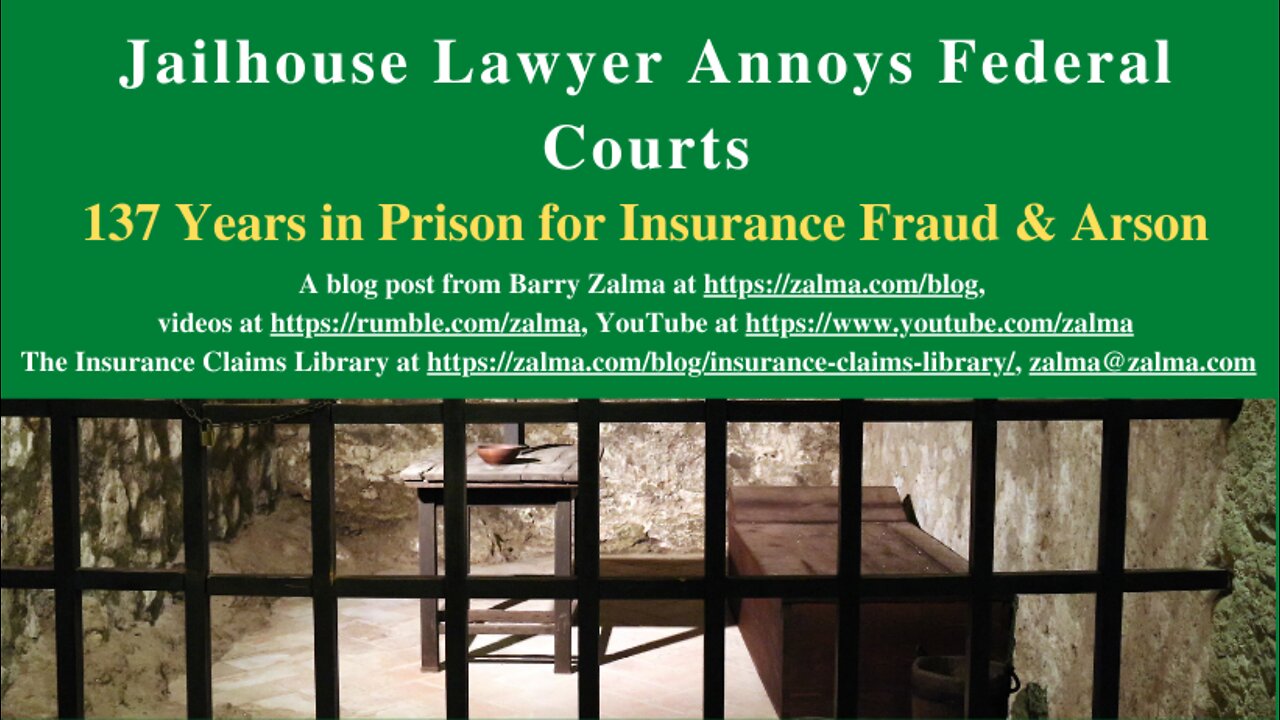Premium Only Content

Jailhouse Lawyer Annoys Federal Courts
137 Years in Prison for Insurance Fraud & Arson
How to Deter Insurance Fraud
A prisoner seeking relief from a lengthy sentence failed after multiple efforts as a pro se applicant. In Ali Darwich v. Warden Lewisburg USP; Attorney General United States Of America, No. 22-2280, United States Court of Appeals, Third Circuit (October 14, 2022), Ali Darwich, a federal prisoner currently confined at the United States Penitentiary in Lewisburg, Pennsylvania ("USP Lewisburg"), appealed pro se from the District Court's order dismissing his petition for a writ of habeas corpus under 28 U.S.C. § 2241.
FACTS
In 2013, a jury in the Eastern District of Michigan convicted Darwich of thirty-three counts related to arson and insurance fraud, including seven counts of using fire to commit fraud in violation of 18 U.S.C. § 844(h)(1). He was sentenced to a total term of 1647 months or 137 years of imprisonment.
He tried multiple times to avoid the sentence only to have the United States Court of Appeals for the Sixth Circuit affirmed, and the United States Supreme Court denied Darwich's petition for a writ of certiorari in United States v. Darwich, 574 Fed.Appx. 582 (6th Cir. 2014), cert. denied, 574 U.S. 1200 (2015). Darwich then moved to vacate, set aside, or correct his sentence under 28 U.S.C. § 2255. The District Court denied the motion, in United States v. Darwich, No. 2:10-CR-20705, 2016 WL 146662 (E.D. Mich. Jan. 13, 2016), and the Sixth Circuit denied Darwich's request for a certificate of appealability, in Darwich v. United States, No. 16-1151 (6th Cir. August 5, 2016) (order). Darwich continued to file numerous unsuccessful motions for authorization to file second or successive § 2255 motions.
In 2022, Darwich filed a petition for relief under § 2241, which the District Court construed as raising three claims: (1) that Darwich's conviction and sentence are unlawful under United States v. Davis, 588 U.S.__, 139 S.Ct. 2319 (2019), Bailey v. United States, 516 U.S. 137 (1995), and Deal v. United States, 508 U.S. 129 (1993); (2) that he was subjected to selective prosecution because of his race or ethnicity; and (3) that the sentencing court erred by imposing consecutive sentences. The District Court dismissed the petition, concluding that Darwich failed to show that § 2255 was an "inadequate or ineffective" remedy so that his claims could be considered under § 224.
ANALYSIS
Motions pursuant to 28 U.S.C. § 2255 are the presumptive means by which federal prisoners can challenge their convictions or sentences. A habeas corpus petition under § 2241 accordingly "shall not be entertained" unless a § 2255 motion would be "inadequate or ineffective to test the legality of [petitioner's] detention." A § 2255 motion is inadequate or ineffective only where the petitioner demonstrates that some limitation of scope or procedure would prevent a § 2255 proceeding from affording him a full hearing and adjudication of his wrongful detention claim.
The Third Circuit agreed with the District Court's determination that Darwich failed to make the showing necessary to meet the safety-valve exception.
First: Darwich alleged that his conviction no longer qualifies as a violent felony. Darwich was sentenced as required by 18 U.S.C. § 844(h)(1).
Second: The District Court's determination that it lacked jurisdiction to consider Darwich's selective prosecution and consecutive sentencing claims.
Third: Darwich has had numerous earlier opportunities to present these claims and the fact that his prior challenges have been unsuccessful and/or a new one would be barred as successive does not make § 2255 an inadequate remedy. Even colorable claims of actual innocence whereby a petitioner is being detained for conduct that was subsequently rendered noncriminal by a Supreme Court decision may meet the § 2255(e) requirement when the petitioner had no earlier opportunity to raise the claims but do not apply, therefore, to Darwich.
The Third Circuit affirmed the judgment of the District Court.
ZALMA OPINION
This case establishes, without doubt, that people who commit insurance fraud have unmitigated gall and deserve their sentences. Arson and arson-for-profit is a violent crime that can cause firefighters or innocent by-standers or tenants to be injured or killed. The sentence was deserved and the making of multiple appeals and motions that are specious deserve sanctions but it would do little to add to a 137 year sentence. The only sanction that will work is to ignore any further move by Darwich.
(c) 2022 Barry Zalma & ClaimSchool, Inc.
Barry Zalma, Esq., CFE, now limits his practice to service as an insurance consultant specializing in insurance coverage, insurance claims handling, insurance bad faith and insurance fraud almost equally for insurers and policyholders. He practiced law in California for more than 44 years as an insurance coverage and claims handling lawyer and more than 54 years in the insurance business. He is available at http://www.zalma.com and zalma@zalma.com.Subscribe and receive videos limited to subscribers of Excellence in Claims Handling at locals.com https://zalmaoninsurance.locals.com/subscribe.Subscribe to Excellence in Claims Handling at https://barryzalma.substack.com/welcome.
Write to Mr. Zalma at zalma@zalma.com; http://www.zalma.com; http://zalma.com/blog; daily articles are published at https://zalma.substack.com. Go to the podcast Zalma On Insurance at https://anchor.fm/barry-zalma; Follow Mr. Zalma on Twitter at https://twitter.com/bzalma; Go to Barry Zalma videos at Rumble.com at https://rumble.com/c/c-262921; Go to Barry Zalma on YouTube- https://www.youtube.com/channel/UCysiZklEtxZsSF9DfC0Expg; Go to the Insurance Claims Library – https://zalma.com/blog/insurance-claims-library
-
 13:02
13:02
Barry Zalma, Inc. on Insurance Law
1 year agoMurder Pays
4071 -
 38:35
38:35
The Officer Tatum
1 hour agoLIVE Whoopi CLAIMS Iran is BETTER Than America, WNBA Players TARGET Caitlin Clark + MORE EP 126
13K8 -
 LIVE
LIVE
LFA TV
19 hours agoLFA TV ALL DAY STREAM - WEDNESDAY 6/18/25
1,781 watching -
 48:43
48:43
The Dr. Ardis Show
4 hours ago $0.92 earnedThe Dr. Ardis Show | Tetanus: Handled Naturally | Episode 06.18.2025
1.18K1 -
 11:52
11:52
Clownfish TV
12 hours agoDisney Plus KILLED Marvel Says James Gunn.
1.08K5 -
 LIVE
LIVE
RalliedLIVE
2 hours ago $0.40 earned24 HOUR BIRTHDAY STREAM
171 watching -
 LIVE
LIVE
Cheyballa718
1 hour agoNew Fortnite Update! Road to 100 Followers! 2/100 Followers
271 watching -
 29:24
29:24
Michael Franzese
23 hours agoRoger Stone EXPOSES the CIA’s Role in JFK’s Murder
17.4K7 -
 1:54:24
1:54:24
The Quartering
3 hours agoTrump TEASES Iran Strike, Supreme Court UPHOLDS Trans Ban, Tucker Vs Ted Cruz & More
105K46 -
 LIVE
LIVE
The HotSeat
1 hour agoPete Is Under Attack At Capitol Hill + That Big Beautiful Flag!
740 watching